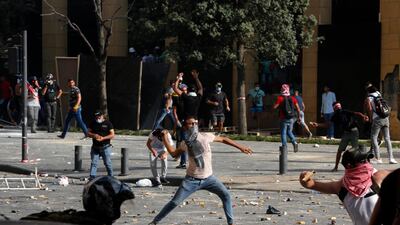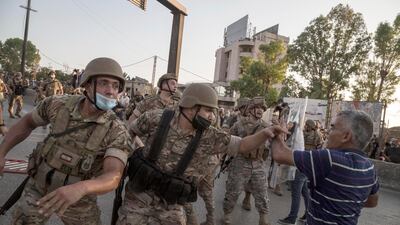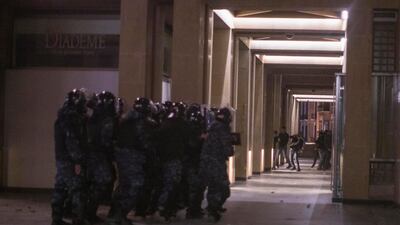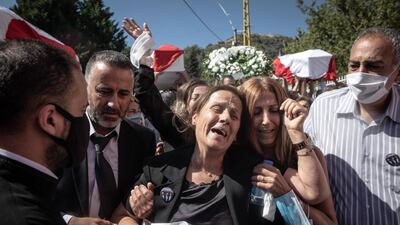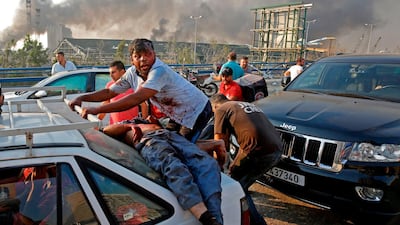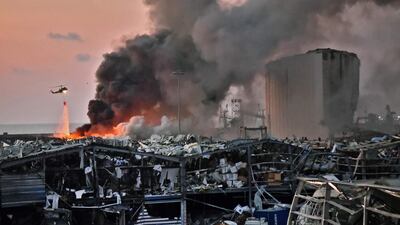When an explosion at Beirut’s port ripped through the city in early August, Britain’s Ambassador Chris Rampling threw open the doors to his residence and welcomed staff displaced by the damage.
The explosion shattered glass and collapsed buildings more than a mile away from the port. More than 200 were killed, and thousands left homeless. Four months on and the city is still limping. Nobody has been held accountable.
Almost 60 people, embassy staff and their families, stayed in the Ambassador’s residence in Yarzeh that night. The hill-top mansion is more accustomed to hosting dignitaries and cocktail parties than the displaced. But after the blast the dining room became “the triage area”, he says.
Now the residence is back to normal, its floors are buffed and the bookshelves well stacked – on them biographies of Geoffrey Boycott and Tony Blair – but Lebanon is a long way from normal.
Mr Rampling will leave Beirut in the coming weeks, ending a two and a half year posting, the final few months of which have been dominated by the blast and efforts to secure a functioning government in Lebanon.
Lebanon – a year in pictures
Two of the UK’s closest allies have led those calls for change.
Though often participants in a united front, there are obvious differences in approaches to Lebanon between the UK, France and the United States. The US has charged forward with sanctions, most recently designating former Foreign Minister Gebran Bassil – son in law of the country’s President Michel Aoun – over alleged corruption. There are reports the country’s Central Bank could soon be designated, isolating Lebanon’s once-flourishing financial sector from the global economy.
In the aftermath of the blast, French President Emmanuel Macron launched the so-called French initiative, dressing down the political class as he demanded all sides give up ground for increasingly vital reforms.
"We strongly support the intent behind President Macron's initiative and I think his words have been sound," Mr Rampling told The National.
Yet a Macron visit in the aftermath of the blast offered indications France might be willing to look beyond traditional sticking points, especially when it comes to Hezbollah, if the Iran-backed group is willing to give ground on other reforms – namely government formation and a forensic audit of the central bank.
Britain considers Hezbollah a terrorist organisation and is ferociously strict about contact with the group. Her Majesty's diplomats have been known to slip away from events where the group’s representatives are present.
Might this overture by Mr Macron suggest differing approaches? Mr Rampling thinks not.
“A lot of people say the Brits, the Americans the French are all in a slightly different place and pulling in different directions. I don’t recognise that; I don’t see that. I think that fundamentally, the US, the French the Brits, we all want the same thing for this country,” he says.
“I think you’ll find there is much more overlap than there is difference.”
Lebanon is also fighting the flight of its educated classes. Doctors and engineers are increasingly moving overseas, with many feeling Lebanon has nothing to offer them professionally.
“As a friend of this country, the dramatic nature of this brain drain, of course, worries me,” he says.
“I think there is a political crisis, but I think there is also potentially a social crisis around this, the number of people that one talks to who are thinking about how they can get out, or how can they get their children out – there is a sense of despair here at the moment.”
Mr Rampling is among a number of foreign diplomats and officials, including Mr Macron, who have done away with diplomatic language recently to air their frustrations about Lebanon’s stalemate.
“It beholds all of us to talk frankly, and in a way that wakes people up. The leadership of this country needs to step up and bear its responsibilities,” he says.
The frustration animates the ambassador, “Are they going to allow this country to continue to slide away and fall into the sea? Or are they going to make a decision that that is no longer what must be allowed?” he adds, leaning forward in his seat.
It might be easy to pin the current situation on the convulsion of the blast, and the global pandemic, but not so fast, he says.
“There are enormously profound challenges in the country, but the issues are deeper even than that blast. The causes of the economic crisis were baked in before the 4th of August.”
Acknowledging the impunity that has protected Lebanon's ruling elite, he says: “Corruption is only a part of that, there is going to be a need to define what kind of economy this is going to be, what kind of society this is going to be.”
“I think a lot of political taboos have been broken down,” he says, striking an optimistic tone in what may be one of the final interviews of his posting.
“There are no conversations that you cannot have in this country, and there are no conversations that people don’t want to have actually, and I think that is a source of hope."








